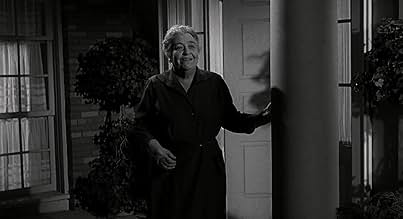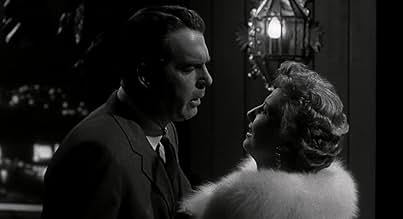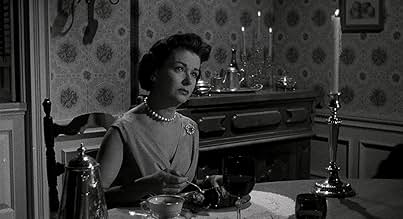Ajouter une intrigue dans votre langueWhen a toy manufacturer feels ignored and unappreciated by his wife and children, he begins to rekindle a past love when a former employee comes back into his life.When a toy manufacturer feels ignored and unappreciated by his wife and children, he begins to rekindle a past love when a former employee comes back into his life.When a toy manufacturer feels ignored and unappreciated by his wife and children, he begins to rekindle a past love when a former employee comes back into his life.
- Réalisation
- Scénario
- Casting principal
Avis à la une
While Sirk's films have often been branded "woman's pictures", "There's Always Tomorrow" is indeed very much a man's picture. It takes a hard and deep look at the role of the male breadwinner and the picture it comes up with is not a pretty one. What we are shown is a man who when young, courted the prettiest girl, married, had children and worked hard to build up a successful business. He is now middle aged and having achieved it all, begins to feel himself taken for granted by his wife and children. His needs are completely neglected. His wife has little interest in him sexually being totally wrapped up in fulfilling the unending needs of their self centered ungrateful children. It's a scenario all too familiar to millions of men. Fred MacMurrays's Clifford Groves has become a robot similar to the one his successful toy manufacturer has created. No wonder that Norma Vale's (Stanwyk) reappearance in his life presents an opportunity to regain his lost dreams. She's an independent career woman, who sees his situation as somewhat idyllic from the outside. But with the usual intelligence of a Stanwyk character, she has no illusions as to a possible future with him. Despite the brief and obligatory conciliatory ending, Clifford Groves' future does not bode well. It should come as no surprise that the film was not well received at the box office.
"There's Always Tomorrow" has many of the hallmarks of Sirk's craftsmanship. The studio refused to grant him his request for the film to be shot in color, despite having provided Universal with some of its highest grossing pictures of the decade. At least his demand for his favorite cameraman Russell Metty was granted. Metty as always, was the perfect partner in realising Sirk's vision. His interior filming in particular is a lesson in cinematography. He had a penchant for shooting characters behind banisters, framed in mirrors and caged behind fences to enhance the sense of their being trapped. MacMurray and Stanwyk are constantly gliding through dark shadow and bright light reflecting the inherent brightness and darkness in their lives.
At this point of writing "There's Always Tomorrow" has not been released in any format and rarely gets a showing on television. It's a gross injustice to an extremely important director and a wonderfully made, moving piece of cinema.
The best part here is that "There's Always Tomorrow" has director Douglas Sirk working in the 1950s, with his best photographer Russell Metty. This means artful shadows, stairways, windows and reflections. Such visuals, especially as they complement the story, are great. There is even a scene with Stanwyck's face shedding tears that are actually reflected raindrops; a technique said to have originated with "In Cold Blood" (1967). Quite possibly, this was done even earlier...
The cast is strangely unimpassioned. MacMurray and Stanwyck lack the level of spark they conveyed in previous collaborations. Perhaps this is the point. MacMurray has become like the toy robot he created. He's "Rex" the walkie-talkie mechanical man. Stanwyck appears to be hesitating an attempted seduction. While not the protagonist, she becomes the most interesting character. Completely and most maddeningly in the dark, Ms. Bennett acts robotically unaware of the threat to her supposedly perfect family life. Shaking things up is suspicious and literate son William Reynolds (as Vinnie).
******* There's Always Tomorrow (1/20/56) Douglas Sirk ~ Fred MacMurray, Barbara Stanwyck, Joan Bennett, William Reynolds
Le saviez-vous
- AnecdotesAcclaimed documentary filmmaker Errol Morris named it as one of his 10 favorite films in the 2002 BFI Sight & Sound Poll.
- GaffesNear the end, Vinnie is telling his girlfriend that he was wrong "about Norma and Cliff" in these exact words. But Cliff is his father; he wouldn't refer to his father by his first name.
- Citations
Norma Miller Vale: Love is a very reckless thing. Maybe it isn't even a good thing. When you're young and in love, nothing matters except your own satisfaction. The tragic thing about growing older is that you can't be quite as reckless anymore.
- ConnexionsFeatured in Perspectives sur la famille américaine (2008)
- Bandes originalesBlue Moon
(uncredited)
Written by Richard Rodgers and Lorenz Hart
Played on one of the toys and heard as a theme throughout the film
Meilleurs choix
- How long is There's Always Tomorrow?Alimenté par Alexa
Détails
- Date de sortie
- Pays d’origine
- Langue
- Aussi connu sous le nom de
- Pasión otoñal
- Lieux de tournage
- Société de production
- Voir plus de crédits d'entreprise sur IMDbPro
- Durée1 heure 24 minutes
- Couleur
- Rapport de forme
- 1.85 : 1
Contribuer à cette page




































